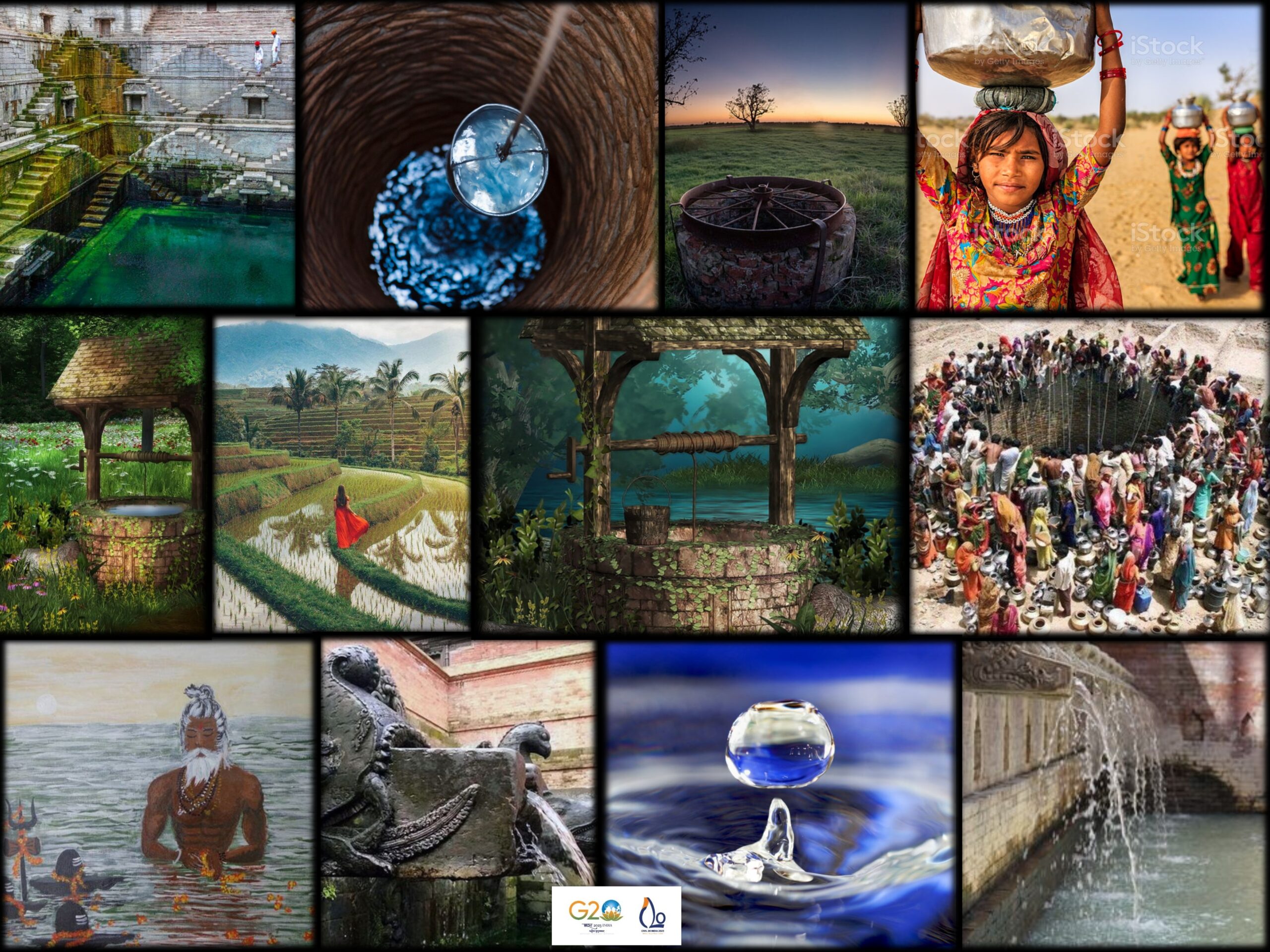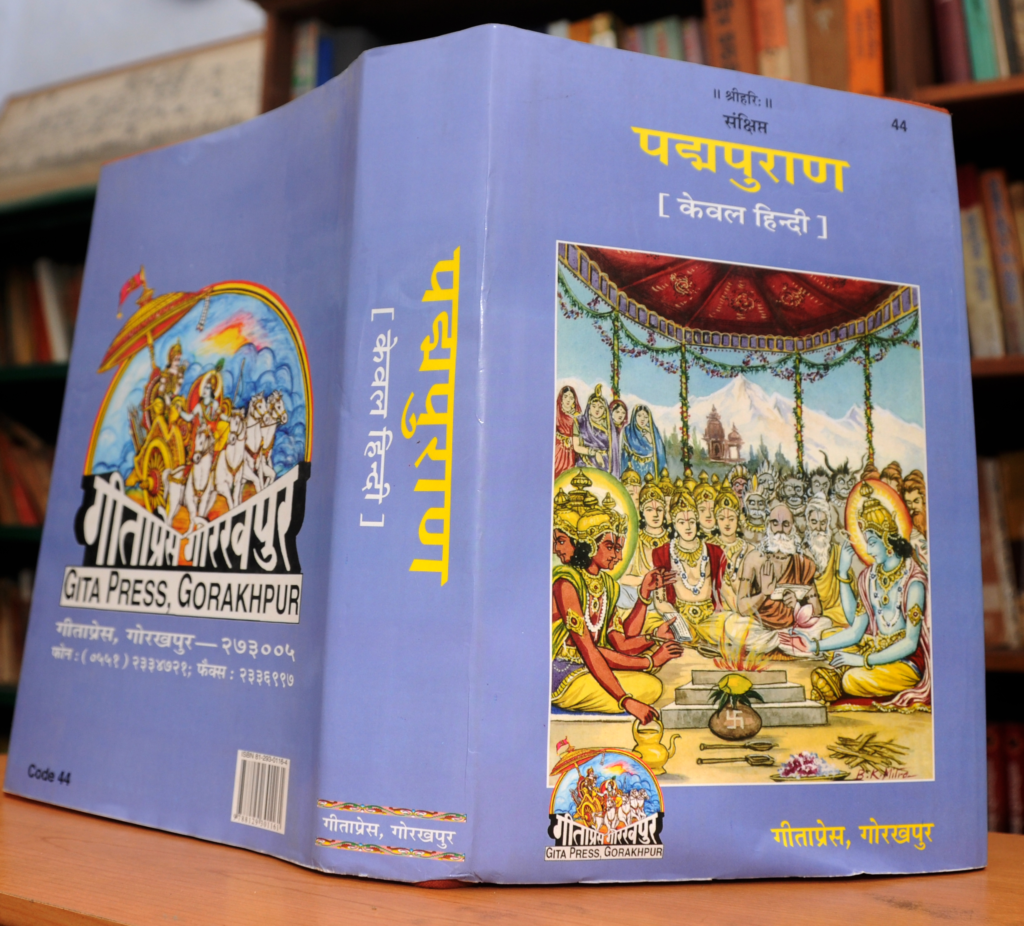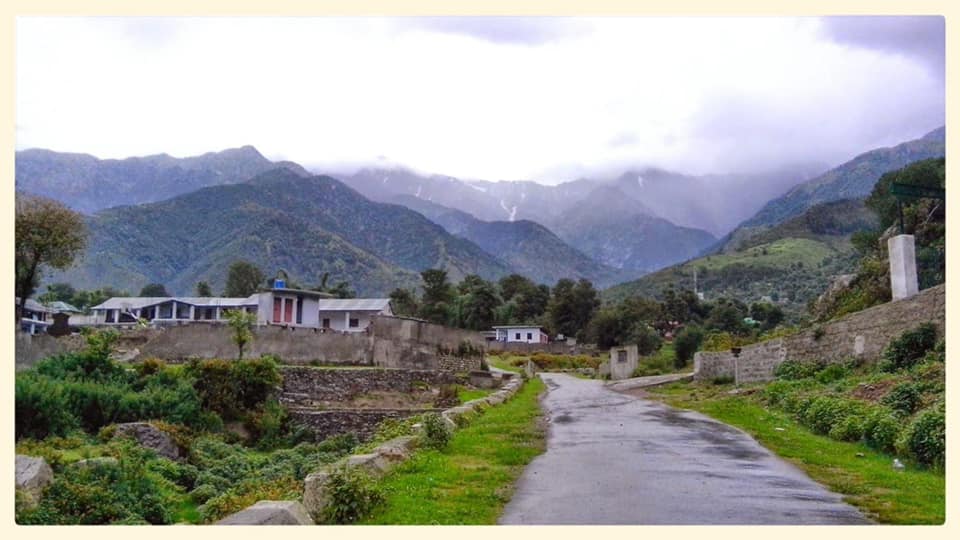- Visitor:23
- Published on:
Signifcance of Installing Wells and Lakes for Sustainable Development of Society (C20_Indic Wisdom Series_Sustainable Lifestyle)
The following piece is taken from the Padma Purana that teaches us how by providing both aesthetic value and environmental sustainability, installation of wells and tanks can also enhance our home and community’s worth and appeal. This small but eco-friendly initiative brings lots of personal, financial and environmental benefits. The ancient Hindus understood this well and made proper use of this wise investment. And, as a result, they enjoyed the rewards of Mother Nature for a prolonged time reducing the dependency on main water source and in this way contributed to India’s water future.

- The following piece is taken from the Padma Purana that teaches us how by providing both aesthetic value and environmental sustainability, installation of wells and tanks can also enhance our home and community’s worth and appeal. This small but eco-friendly initiative brings lots of personal, financial and environmental benefits. The ancient Hindus understood this well and made proper use of this wise investment. And, as a result, they enjoyed the rewards of Mother Nature for a prolonged time reducing the dependency on main water source and in this way contributed to India’s water future.
1-3a. O brāhmaṇa, tell me in detail, about the rite (which is performed) with reference to lakes, gardens, ponds, wells and ponds full of lotuses, and temples of deities. Tell me which brahmaņas are employed as the priests there; (tell me) also (about) the fees to be paid to the priests, (about) the offerings, the time, the place and the preceptor. O you of a good vow, tell me also about the components that are prescribed (for the rite).
Pulastya said:
3b. O king of mighty arms, listen to the description of the rite performed with reference to the lakes etc. 4-6. O best king, this account is narrated in the Puranas. When Uttarayana comes, a man, having obtained (i.e. having chosen) the auspicious bright half of a month, on a day declared to be auspicious by the brāhmaṇas, should get fashioned an altar measuring four cubits, even, and having four corners and four openings in a region free from evil things and near a lake, Similarly there should be a pavilion open on four sides and of the measure of sixteen cubits.
7. Around the altar there should be holes of the measure of the cubit of the middle length and having three belts. O prince, they should be nine, seven or five (in number), and should not have curved openings.
8. The receptacle should be of the measure of the length equal to twelve angulas¹, and six or seven fingers in expanse. The holes should be of the measure of a cubit3 and should have three belts raised at three steps.
9. On all the sides there should be banners of the same colour, along with flags. He should get fashioned doors of the branches (i.e. parts) of (the trees viz.) Asvattha, Udumbara, Plakṣa and Vata, for the pavilion in every direction.
10-12a. There should be eight sacrificial priests (who recite the prayers of the Rgveda) and eight door-keepers. There should be eight brahmanas, well-versed in the Vedas, as the mutterers (of sacred texts). He should place (i.e. appoint) best brahmanas, endowed with all (good) signs, knowing the sacred texts, with their senses curbed and (belonging to good) family and having a (noble) character.
12b-13. In every hole he should put pitchers, and materials for the sacrifice; the seat should be white and (equipped) with a fan; there should be a very big copper-vessel. Then there should be offerings of various colours for each deity.
14-15. The wise preceptor should put (the various things) on the ground after having consecrated them. The sacrificial post, made of the Ksira tree, should be of the length of a cubit¹ or of the size of the sacrificer; desiring his well-being, he should fix it. He should engage twentyfive priests with golden ornaments on their persons.
16-17. He should give to all the priests, equally, golden armlets, bracelets, and also finger-rings, and various kinds of garments; it is prescribed that the preceptor should be given double (of what is given to other priests). He should also give (these things) with a bed and also whatever is dear to himself.
18-20. O king, having first obtained all these, viz. golden (images of) a tortoise and a crocodile, silver (images) of a fish and a (kind of) snake (not poisonous), copper (images of) a shark and a frog and iron (image of) a porpoise, the sacrificer, along with his wife, sons and grandsons, should be bathed by all (brahmaņas) who have mastered the Vedas, with water (mixed) with all herbs.
21-22. (Then) he, having reached the western entrance, should enter the pavilion. He, knowing the truth, should draw a circle with dust of five colours to the accompaniment of auspicious sounds and the sound of kettle-drums; and also (he should draw) a wheel with sixteen spokes and the figure of Brahma within a lotus.
23-24. It should have four corners (i.e. it should be drawn within a square), should be circular on all sides and richly decorated in the middle. The wise one, having fashioned the images of the planets and the regents of the quarters around the altar, should properly install all of them in every direction having recited the text sacred to Varuna he should place the pitcher at the centre.
25-26a. The wise should install (the images of) Brahma, Siva and Visņu there only. Having installed (the images of Vinayaka, Kamala (i.e. Laksmi) and Ambika (i.e. Parvati) he should, then, for the peace of all worlds, install (the images of) the group of spirits.
26b-28a. Having thus made the installation with flowers, eatables and fruits, he should cover those pitchers containing gems with pieces of cloth. Having on all sides, decorated the door-keepers with flowers and sandal he should say to them: (Please) proceed with the sacrifice’ and should honour the preceptor.
28b-29. Two (brāhmaṇas) knowing the Ṛgveda should be kept (i.e. seated) in the east; two (brāhmaṇas) knowing the Yajurveda should be kept (i.e. seated) in the south. Two (brahmaņas the) singers of the Samaveda should be kept (i.e. seated) in the west; and two (brahmanas) knowing the Atharvaveda should be seated in the north. The sacrificer, facing the east, should sit in the south.
30. He should again tell the sacrificing priests to (commence the) sacrifice: ‘Please resort to the muttering of excellent sacred texts.’
31. Having thus advised all those mutterers (of the sacred texts) and he, knowing the sacred texts, having kindled the fire, should offer into it ghee and sacred sticks (to the accompaniment of the recital) of sacred texts.
32a. The sacrificial priests of the Rgveda should make offerings all round into the fire with (the recital of) texts sacred to Varuna only.
32b-35a. Having duly made offerings to the planets, and also to Indra and the lord, to the Maruts, the regents of the quarters and to Viśvakarman, the priest (called) Bahre (seated) in the east should mutter separately the auspicious Santisukta, the prayer to Rudra and Pavamana, the Purusa-sükta. The priests knowing Yajurveda seated in the south should recite the silkta (i.e. eulogy) of Sakra, Rudra, Budha, and also a hymn address ed to the demons called Kuşmanda’, the sukta (i.e. eulogy) of Játavedas (i.e. Fire), and of the Sun.
35b-37a. The Sama-singers seated at the western door (of the pavilion) should sing the Samans called Vairaja Paurusa Sakta, Sauparna Sukta, Rudras akta, Saitava Sakta, Pañcanidhana Sakta,
Gyatra Sakta, Jestha Saman, Vamadeva Sakta, Brhatsman, Rauraca, Rathantara, the celebrated Gavam Vrata, (the hymns called) Rak- soghna and Tama.¹ 37b-38. The priests of the Atharva Veda (seated) in the north, should, resorting mentally to Lord Varupa, repeat the Santika and Paustika hymns (from the Atharvaveda).”
39-41a. Having thus fully made the consecration of the image at night of the previous day, and having brought earth from a hamlet where cowherds and cows stay, and where ele- phants, horses, chariots and anthills are found, he should put it and the herbs also into pitchers. Then bringing the yellow pigment, white mustard, sandal and a fragrant gum resin, he (i.e. the sacrificer) should be bathed with (water mixed with) the five products of a cow.
41b-43. Having thus first duly done the bathing of the sacrificer to the accompaniment of great religious texts, and having thus spent the night in the acts performed according to sacred precepts, he should at clear daybreak give a hundred or eighty-eight or fifty or thirtysix or twentyfive cows to brahmanas.
44-45. Then when the time of an auspicious moment of the Sun’s entrance into a zodiacal sign approaches, he should take down into water, a cow decorated with gold to the accompani- ment of Vedic texts, divine music and various musical instruments. O king, that cow should be given to a singer of Samans. 46-48a. Then having taken a golden vessel (decked) with five jewels, and then having fully placed into it the (golden) crocodile, fish etc., he should put it, while held by four brahmanas well-versed in Vedas and Vedängas, and containing the water of great rivers, into water with its opening turned down and facing the north.
48b-49. Then having well-bathed (the image of) Mayà, he should put it (into water) to the accompaniment of the sacred hymn Apohistha and then having come (back) to the pavilion, and having honoured the members (of the sacrificial session) he should make offerings on all sides.
50. Then he should make offerings for four days. He should perform the (proper) rite on the fourth day and at that (rite) also he should give (presents to brahmanas) according to his capacity.
51. Arranging the sacrificial vessels and the sacrificial material, he should distribute these equally among the priests.
52. Then he should pull down the pavilion; and he should give the golden vessel and a bed to a brahmana. Then, according to his capacity, he should feed one thousand, or eight hundred or fifty brahmaņas.
53-54. The rite about the lakes is thus narrated in the Puranas. The same rite is prescribed in the case of all wells and reservoirs of water and lotus-pools; and in the case of instal- lation (of images).
55. In the case of palaces and gardens the difference lies in the sacred texts (i.e. the sacred texts are different). In the case of one who does not have the capacity (to spend so much), the rite as decided by Brahma (is to be performed) with half (the expenditure).
56. When (the means) are few, the rite should be performed (as in the case of a rite with one fire) by (men) free from the vanity of wealth. The water that remains in the lakes in the rainy season after such a rite is performed, is considered to be equal to (i.e. gives the fruit of) the Agnistoma sacrifice.
57. That (water) which remains (in the lakes) in the autumn gives the fruit described above. That (water) which remains in the lakes in the cold and winter seasons (comprising of the months of Märgasirsa to Phalguna) is equal to the Vaja- peya and Atiratra sacrifices (i.e. gives the fruit of Vajapaya and Atiratra).
58. That (water) which remains (in the lakes) in the spring season is equal to (i.e. gives the fruit of) the Afvamedha sacrifice; and that water too that remains (in the lakes) during the summer excels (the fruit of) the Rajasiya (sacrifice).
59-60. O great king, he, the pure one, who, of an extre- mely pure mind, performs these special religious deeds, goes to Brahma’s abode only, and (there) rejoices for many Kalpas. Having moved in many worlds, and having enjoyed (in) the worlds like Seah, with beautiful ladies for two parardhas (i.e. for a very very long period), he, again goes to Vişnu’s place, obtain- able by the power of deep and abstract meditation,
42-52a. Those who are engaged in performing sacrifices, digging wells and performing other acts of charity, those who are engaged in (performing) the five sacrifices, and those who are always full of compassion, never see Yama’s abode. Those brahmanas who have turned away from objects of sense, who are competent and are teachers of the Vedas, who are always engaged in worshipping fire, go to heaven. The Sun is the path (destination) of those whose faces are not sad, who are brave (though) surrounded by enemies, who die in battles. O vaisya, those who cast their life while protecting a helpless woman, a brah mana who has sought their refuge, do not fall from heaven. O vaisya, those who always protect the lame, the blind, the young, the old, the sick, the helpless and the poor, always rejoice in heaven. Those who, on seeing a cow plunged in mud or a brahmana sinking in disease, emancipate them, get the world of those who perform the horse sacrifice. Those (men) who give a morsel (of grass) to a cow, who always nurse cows, who do not mount upon a cow’s back, live in heaven. Those men who have just made (i.e., dug) a ditch where (from) a cow (having drunk water) is free from thirst, go (straight) to heaven without even seeing Yama’s world…

In praise of digging tank
The brahmanas said:
1. O best sage, tell us, if you favour us, (how) fame and dharma (can be accomplished) in the worlds, and (tell us about) all the excellent things (in the three worlds).
Vyasa said:
2. He, in whose dug up (portion of) forest, cows are satis- fied (by grazing) for a month, or seven days, is purified and is honoured by all gods.
3. Listen to all the fruit that is here (i.e. in this world obtained) by offering water, especially at a pool purified by (the performance of) a sacrificial rite.
4. It is brought about year after year and kalpa after kalpa. By giving (gifts) a man obtains heaven; and one who offers water becomes the giver of everything on the earth.
5. A man enjoys heaven for as many years as (number of) drops that are produced on the tank (etc.) dug up (by him), when the cloud is showering (drops ofrain).
6. A man becomes pleased by (drinking) water and (en- joying) cooked food etc. Life cannot be sustained without food.
7. Gratification of the manes, purity, form, removing bad smell-all this, the seed that is obtained (and that will lead one to heaven), is settled in (the gift of) water.
8. Washing the clothes, making the utensils shine-all this is to be done with that (i.e. water) only. Therefore water is pure only.
9. Therefore with all one’s capacity and all one’s wealth a man should get fashioned, making all efforts, a well, a tank or a pool.
10. Therefore, upon him, who gives (i.e. constructs) a water-tank in a place, where there is no water, (the charitable act) would day by day bestow heaven (where he would stay) for a kalpa.
11. That brahmana, fallen from heaven, becomes a master of the Vedas; and the religious-minded brahmana, the kinsman of the world, would go to heaven after having practised penance.
12. Thus he gets eight births, and (the fruit) of one of them is said to be inexhaustible. Such a man, (if) born in a ksatriya- family, would become a sovereign emperor..
13. (If born as) a vaisya (he) would obtain inexhaustible wealth very much liked by him in birth after birth. Others like sūdras again and again go to heaven.
14. Whoever digs a tank of the measure of four cubits, the tank always helps him to stay in heaven for a kalpa after a year.
15-16. If (the measure) is double, (one) should know that the merit is double, and if it is fourfold, (the merit) would be huhdredfold. He, who gives (i.e. constructs) a tank of the measure of twenty cubits, would obtain (i.e. go to) Visnu’s abode, and also divine enjoyments. Afterwards, he is born as a king or would be a wealthy man or an orator.
17. It is laid down that (by doing) like this twofold, threefold or fourfold enjoyment (is obtained). If the tank is extensive, know that the enjoyment would be profuse; if its measure is a thousand cubits he does not fall from heaven.
18-19. If it is two thousand, a man becomes honoured by gods. And as many men as there are beings in his house or in the region, forever become his servants going after him for as many (years) as the beings would live.
20-21. Pleasures enjoyed without a parent are like a forest (resorted to after one’s) wealth is exhausted. Birds, a pig, a female buffalo, a female elephant, an adviser and a doer-these six lead (one) to heaven. The divine hundred of birds would bestow heaven.
22. A hog would bestow it for a thousand years, and a female buffalo for a myriad years. A lakh is said to be the fruit of a female elephant after one has resorted to a divine form. 23a. For the adviser it is a crore years and eternal for a doer.
23b-24. Formerly, a wealthy man, having faith in Siva constructed a tank for obliging (i.e. helping) all beings by (spending) a myriad (i.e. very large) amount and at the cost of his life and capacity.
25. It is said that after some time he became poor. Some wealthy man desiring (to buy the tank) was ready to pay him its price.
26-27. Having reflected, the wealthy man said: “Listennow to (my) words. For this (tank) I shall pay you a myriad dinaras. You have already obtained the religious merit by (the construction of) the tank. If you think to get (money by selling it). I am ready to own it (i.e. to buy it) by offering the price according to my capacity.” 28-31. When he said this, he (i.e. the owner of the tank) said to him: “Again everyday the fruit is ten thousand (times more). The meritorious (alone) know (what) merit (is). In this waterless region I constructed an auspicious tank. All do acts like bathing and drinking of its water as they like. From it I, who have a myriad (dinâras), desire an eternal fruit. These words of (i.e. uttered by) me are true. Test me justly.”
32-34a. But through jealousy he said to him: “O father, listen to my words. Instead of giving these ten thousand dinaras to you, I shall bring (i.e. buy) stones (with that amount). I shall throw them into your tank; let them, according to the circumstances, sink into it. If the stones come up and float (on the surface), then my wealth will perish; otherwise the tank will be legally mine.”
34b. He (i.e. the owner) said: “All right.” He took the myriad (of dinaras) and went home.
35-38a. In the presence of witness, he dropped stones into great tank; this was seen by men, gods and demons. Then the with Dharma as the witness, it was weighed in the balance of dharma, Even for a day, the offer of a myriad of dinaras and the water of the tank were not equal. The mind of the wealthy man was sad due to his mission having failed. The next day the eap of stones came up and remained like an island on (the surface of) the water.
38b-39. Then there arose a loud cry of the people. Hearing that wonderful cry (of the people), both of them gladly came there. Seeing that hill (i.e. that heap of stones) he gave a myriad(dināras). 40. Then the owner of the tank threw away the heap. He (obtained) the merit from the tank that had disappeared (due to stones being thrown into it) by the son (i.e. the purchaser). 41-42. He too went to heaven, and was happy in every birth. Digging a tank has an inexhaustible fruit for the family, hosts of mothers, kings, friends, those who oblige, orphans, ascet ics and especially for brahmanas.
43-44a. Having constructed a tank, a man gets heaven eternally. Therefore, O brahmanas, there is no doubt that he who constructs a tank etc. according to his capacity has all his sins destroyed and would go to (ie. obtain) the auspicious salvation.
44b-47. That religious man who would cause people to hear (ie. recite to them) this very excellent meritorious account gets the fruit of the entire gift of a tank. A man having heard (i.e. who listens to this account) on a solar eclipse day at the ex- cellent bank of the Ganges, would get the fruit of the gift of a crore of cows. He is not reduced to poverty nor does he have grief or a group of diseases. He does not experience disrespect or great grief.
[Note:
Vitasti; a measure of length equal to 12 angulos (being the distance between the extended thumb and little finger).
Hasta; a measure equal to 18 inches,
Ratni: (seems to be a corruption of aratni)-the distance from the elbow to the end of the closed fist, a cubit.
Aratni: a cubit of the middle length, from the elbow to the tip of to little finger.
Kausmanda: addressed (as a hymn) to the demons called Kupanda. 2. Pauruşa Sakta: Rgveda X.90. It is regarded as a very sacred hymn.
Saifava, Pafcanidhana, Vairaje are names of various Samans-Saman is first mentioned in Rgveda X.90.9. Jesthasdman-Name of a Saman; see Mahabharata XII. Vamadevya-perhaps samans composed by Vamadeva, who was a sage credited with the authorship of a larger portion of the IV mandala of the Rgveda. 2. Santika, Pausfika-Certain hymns from the Atharvaveda. Atharoapa a priest or brahmana whose ritual is comprised in the Atharva Veda]
Bibliography:
Padma Puran (Gita Press, Gorakhpur)
Padma Purana, Srishtikhanda, Chapter 57
Padma Purana, Bhumikhanda, Chapter 31
Center for Indic Studies is now on Telegram. For regular updates on Indic Varta, Indic Talks and Indic Courses at CIS, please subscribe to our telegram channel !
- 11 min read
- 0
- 0










